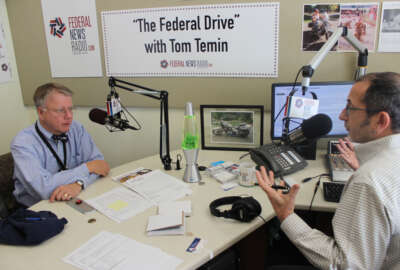

The task force will last as long as six months and give recommendations that may turn into legislation.
The House Armed Services Committee is tasking a handful of its members with looking ahead at the United States’ threats. Far ahead.
Congress and the Pentagon are guilty of being shortsighted in their goals, budgeting and strategy, according to Reps. Seth Moulton (D-Mass.) and Jim Banks (R-Ind.) who co-chair the new task force. But the inability to plan 30 years or 40 years in advance is harming the United States, as China and Russia emerge as its main competitors.
The committee formed the Future of Defense Task Force to address that issue, and to specifically “review U.S. defense assets and capabilities and assess the state of the national security innovation base to meet emerging threats,” states the Oct. 18 release from the committee.
The committee will meet for three months with the option of renewing for another three months. After that, it will produce a report of recommendations, and possibly legislation.
“America is at a crossroads where we face an extraordinary number of threats around the globe and a lot of us feel like we are not asking enough of the big strategic questions,” Moulton told reporters Tuesday. “These questions aren’t just about where we need to be in the next year or five years or 10 years, but 30 years from now against threats like China, Russia and the ongoing threat against transnational terrorism.”
The task force will hold hearings with experts to build its recommendations, but Moulton and Banks offered scant details on the topics, quantity or guests for those hearings. There will be a mixture of open- and closed-door briefings, however.
The task force’s first hearing will be on “theories of victory” next Tuesday. The witnesses will be former DoD Policy Undersecretary Michele Flournoy and former-Sen. Jim Talent.
Other members of the task force include Susan Davis (D-Calif), Chrissy Houlahan (D-Pa.), Elissa Slotkin (R-Mich.), Scott DesJarlais (R-Tenn.), Paul Mitchell (R-Mich.) and Michael Waltz (R-Fla.).
Moulton and Banks said some topics they’d like to tackle are artificial intelligence, biotechnology and hypersonics.
“America hasn’t faced two adversaries like China and Russia since the 1930s,” Moulton said. “The pace at which China, in particular, is trying to leapfrog us with their commitments to artificial intelligence, their investments in biotechnology; a whole range of things. They have a multi-decade plan and we need to have that to beat them.”
Moulton and Banks were quick to point out that they are going into the hearings with an open mind. They do not want to prejudge the conclusions, and will listen earnestly.
The Defense Department made significant changes based on the growing threat of near-peer adversaries in the recent past.
Partly at the behest of Congress and within its own ranks, the past five years brought drastic changes to the Pentagon’s acquisition process, DoD and lawmakers are in the process of overhauling the military’s personnel structure to recruit and retain talent, and DoD created new nodes to reach out to innovative companies in the private sector.
Those initiatives came from commissions, reports and studies done at the request of the Pentagon and Congress.
Moulton said part of what the task force will address is why it takes DoD so long to implement or fully ingrain some of the flexibilities Congress gave the Pentagon to gain talent and connect better with companies building exciting technologies.
“Of course we will talk with some of the old faces, but I think you will see us bring in a lot of outside-the-box thinkers and outside-the-box people,” Moulton said.
He added that Congress needs to do more future thinking, not only on military issues, to prepare the nation for the challenges it faces in the long term.
Copyright © 2024 Federal News Network. All rights reserved. This website is not intended for users located within the European Economic Area.
Scott Maucione is a defense reporter for Federal News Network and reports on human capital, workforce and the Defense Department at-large.
Follow @smaucioneWFED

